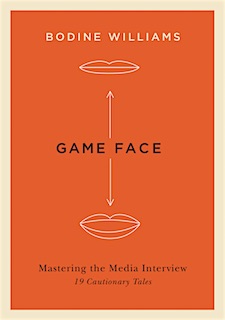|
|
Trump lost the debate because he failed to pivot from “I” to the presidential ”we” which made the evening more about him than the American people. Knowing when and how to talk about yourself in context is a challenge for any CEO or leader. This is the course correction Donald Trump’s team should be focusing on.
|
|
It’s Trump’s belief that his success qualifies him to be president. The former reality-TV star mixes his personal and public personas with ease. Something Clinton has trouble doing. While Trump appears open and authentic, she struggles to become a candidate people can relate to.
In the first debate we saw the convergence of one candidate who often blurs the personal-professional boundaries with the other candidate who rigidly observes them. Clinton seized the chance to get personal and soften the perception of herself.
Responding to the opening question from moderator, Lester Holt, Clinton offered two personal references, and they were calculated. Asked how the next president would create jobs, Clinton reminded the 81 million viewers that she was a grandmother. She didn’t do this in a touchy-feely way and didn’t mention the child’s name. She moved quickly from the personal “I” to the inclusive “we,” speaking in the language of leadership.
“Today is my granddaughter's second birthday, so I think about this a lot. First, we have to build an economy that works for everyone, not just those at the top. That means we need new jobs, good jobs, with rising incomes.”
Minutes later, Clinton offered a glimpse of her father, again no name, who she described as a hard worker and businessman.
“He printed drapery fabrics on long tables, where he pulled out those fabrics and he went down with a silkscreen and dumped the paint in and took the squeegee and kept going.”
She said this immediately after announcing to the world that Trump’s business launched after he received a $14 million loan from his father. The tale of two fathers allowed Clinton to puncture Trump’s image as the self-made man and signal her link to middle-class voters.
As we’ve learned, Trump did not formally prepare for his first one-on-one presidential debate. If he had, his team might have curbed a tendency, entrenched at his rallies of like-minded fans, to frame every response with self-absorbed, egocentric rhetoric. Last March, Trump spoke of his expectation as the possible future commander in chief: "I’m a leader. I’ve always been a leader. I’ve never had any problem leading people. If I say do it, they’re going to do it.” In July, more evidence of his over use of certain pronouns: “nobody knows the system better than me, which is why I alone can fix it.”
Holt asked Trump about a possible conflict of interest as he continues to withhold his tax returns. Trump’s response included this bit of self-praise: The income is filed at $694 million for this past year; $694 million. If you would have told me I was going to make that 15 or 20 years ago, I would have been very surprised. But that’s the kind of thinking that our country needs.”
It was an astonishing, tin-eared response. Trump continued to talk about Trump during the segment on prosperity for average Americans, most struggling to get by. Clinton used her time to talk about raising the minimum wage, reducing the high cost of student loans and gender inequality.
More telling revelations of Trump’s mindset came when the moderator turned to the topic of race relations, referencing the tragic shootings in Charlotte and Tulsa. Clinton gave a well-rehearsed appeal to reform the criminal justice system. Trump started strong saying it came down to two words, “law and order,” but could not resist making personal references and asides. “And when I look at what’s going on in Charlotte, a city I love, a city where I have investments.”
He volunteered his opinion of Chicago as a “terrible” place before adding, “I have property there.” So enmeshed is Trump in promoting his properties, clubs, golf course, he seems unable to switch gears (even with the largest audience to watch a presidential debate), and respond to questions with words that are helpful to his candidacy.
There were moments in the debate when Trump sounded like he was fighting for the workers and not railing against the political class that he insists have “messed” up the country. He called Clinton out on her trade positions, specifically her flip-flop on the Trans-Pacific Partnership trade deal. It was his most effective verbal exchange and best debate moment.
“NAFTA is the worst trade deal maybe ever signed anywhere, but certainly ever signed in this country. And now you want to approve Trans-Pacific Partnership. You were totally in favor of it. Then you heard what I was saying, how bad it is, and you said, I can't win that debate. But you know that if you did win, you would approve that, and that will be almost as bad as NAFTA.”
When that was over Trump, went back to pouting, strangely unaware that he was on a split screen the entire time. Clinton, meanwhile, looked right at her audience, never allowing herself to be distracted. When Trump attempted to bait her—which worked so well against his primary rivals: “Low-Energy Jeb, ” “Lyin’ Ted, ” “Little Marco,”—she looked reflectively in his direction with a canned smile, and then turned away.
Preparation, discipline and effective coaching enabled Clinton to best Trump who is the more gifted, natural performer with the kind of stage presence rarely seen in American politics. Still, Clinton never landed a knockout blow. What she did was challenge and needle Trump, triggering the rhetorical recklessness that he’s shown before.
Perhaps missing the adoration of his boisterous fans that cheer his freewheeling verbal boasts and put-downs, Trump seemed to disengage during the last half hour. He didn’t appear to be having fun. It looked as if the man who built a personal brand on winning was losing.
Looking to the second debate on October 9th, Trump should calibrate his language to engage the pool of undecided voters and those tepidly leaning toward his opponent. His team would do well to start building a more voter-friendly vocabulary full of “we” and “us” to reflect a would-be president willing to embrace the American family, warts and all. This will give Trump his chance to show voters what winning looks and sounds like when tested.
* * *
Bodine Williams is a public relations consultant who specializes in crisis communication, issues management and media training. Her new book, Game Face: Mastering the Media Interview, 19 Cautionary Tales, is available on Amazon.




 The ridiculously high prices Americans are paying at the supermarket might influence how—or if—they vote in November.
The ridiculously high prices Americans are paying at the supermarket might influence how—or if—they vote in November. At a moment in history when there are so many conflicts among peoples here and abroad, let us put our differences aside and celebrate this wonderful season in a spirit of togetherness.
At a moment in history when there are so many conflicts among peoples here and abroad, let us put our differences aside and celebrate this wonderful season in a spirit of togetherness. The news announcing the death of Henry Kissinger, the last of the prevaricating politicians and so-called statesmen who stole my future and that of thousands of other young Americans, got me thinking about Walter Cronkite.
The news announcing the death of Henry Kissinger, the last of the prevaricating politicians and so-called statesmen who stole my future and that of thousands of other young Americans, got me thinking about Walter Cronkite.


 Have a comment? Send it to
Have a comment? Send it to 
No comments have been submitted for this story yet.